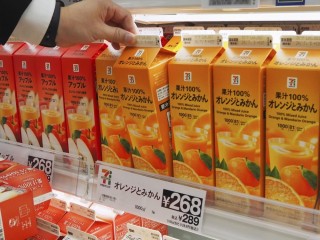Loading
Search
▼ Japan's Orange Juice Makers Facing The Squeeze As Supply Dries Up
- Category:Other
Orange juice, once a staple in Japanese households, is becoming increasingly scarce on store shelves.
The culprit is not a decline in consumer interest, but a severe disruption in the supply chain as domestic orange juice producers halt operations amid soaring prices and crop failures in key orange-growing regions worldwide.
The historic depreciation of the yen over the last three years has made matters worse as Japanese companies, who rely on imports for over 80 percent of Japan's fruit juice demand, fight an uphill battle to purchase the juice overseas.
According to the Japan Fruit Juice Association, the import price per liter of orange juice nearly doubled from 267 yen in 2021 to 491 yen in 2023.
The main reason for the price surge is a supply shortage due to bad weather and disease. Serious crop failures in Brazil, the world's largest orange juice producer and accounting for half of Japan's orange juice imports, led to a sharp decline in imports in 2021.
Production had been on the mend but the disease has spread to the United States, resulting in a worldwide shortage of orange juice. Juice can be frozen and stored for several years, but an association official admits: "We don't even have it in stock."
For orange juice makers, the falling yen is a double whammy. European and U.S. juice importers' products are trading at even higher prices due to strong demand in their countries. Japanese companies face international market prices that prevent them from making a profit due in part to the weak yen's inflation of import prices.
A representative of a Japanese trading company involved in imports said that without a good harvest in Brazil, it will be hard to turn the situation around quickly.
"Although we are getting some juice from Israel and Mexico, the amount is limited," the official said.
The price surge in the global market forced Morinaga Milk Industry Co to temporarily halt shipments of its Sunkist Orange 100 percent juice brand on June 17, and there is no indication the product will reappear anytime soon.
Megmilk Snow Brand Co has also suspended sales of 450- and 1,000-milliliter bottles of its Dole Orange 100 percent juice products since April 2023, with sales currently limited to 200-milliliter bottles.
Research firm Fuji Keizai Group Co forecasts that sales of 100 percent orange juice in Japan in 2024 will fall 7 percent from the previous year to 31.9 billion yen.
Indeed, the supply squeeze has led to desperate measures. In April, Seven & i Holdings Co withdrew sales of its private brand 100 percent orange juice beverage and replaced it with a juice made from a mixture of orange and domestic mandarin orange juice.
Ehime Beverage Inc., based in the Ehime Prefecture capital of Matsuyama, a longtime seller of the Pom Juice product, has increased the ratio of domestically produced mandarin orange juice contained in the drink to more than 50 percent and changed its label from "orange-mandarin juice" to "mandarin-orange juice" instead.
Some companies have taken action against disease. Suntory Holdings Ltd, whose subsidiaries handle Orangina and Natchan! juice products, is taking part in a research project being conducted by an international agricultural research institute in France to develop disease-resistant varieties of citrus fruits.
"Not only fruit producers, but also beverage manufacturers must take steps to ensure the sustainable procurement of juice," a company official in charge said.
© KYODO
- July 29, 2024
- Comment (0)
- Trackback(0)


